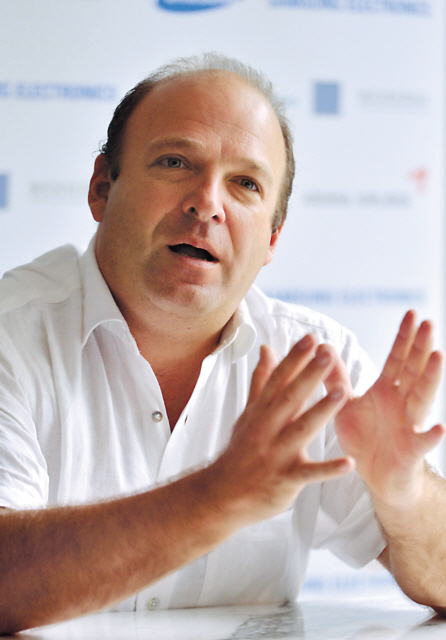Director of the National Trust Wales talks about running the conservation charity, essence of traveling
Justin Albert knows how to tell stories, and how to travel.
The director of the National Trust Wales, a U.K. conservation charity, holds two passports: one British, one American. He grew up in film studios, watching his mother making movies. When he was 14, his mother took him to Japan for the first time. His first visit to Japan was like “reading a fantasy novel,” he remembers.
“I wish I had a hundred passports,” said Albert, who arrived in Seoul on Sunday to attend a culture and communication-themed forum hosted by Corea Image Communication Institute.
“I just feel so strongly that different cultures have so much (more) in common than (not). The more I travel, the more powerfully I believe in that.”
 |
Justin Albert, director of the National Trust, speaks during an interview with The Korea Herald in Seoul, Monday. (Lee Sang-sub/The Korea Herald) |
For more than 20 years, he produced a vast number of documentaries on history and culture, as well as travel programs for the Discovery Channel, BBC, NHK and National Geographic. He traveled extensively for these documentaries, visiting countless countries around the globe. His works dealt with ancient relics in China, deserts of Namibia and national parks in the U.S.
Last year, he was appointed as the director of the U.K. conservation charity, an organization dedicated to preserving cultural heritage. The former documentary filmmaker, who has always been interested in history and different cultures, says his new job has been “fantastic” for the past year.
“I look after the national parks, museums, coastlines, mountains and the birth place of King Arthur,” Albert told The Korea Herald.
“I look after the beaches where they shot ‘Harry Potter.’ … I do see my job is to give people amazing experiences. Millions of people visit our properties every year in the countryside. My hope, like when they saw my television programs, is that the visitors will come away feeling better. For an hour or two, they’d forget their problems and the economic crisis and see something beautiful. They’ll swim in the ocean, or they’ll learn how to climb the trees. I think that’s a very important role for culture. It’s also very much like a spiritual relief. ”
During the forum, Albert will talk about how important it is for organizations in the globe to look after culture and work together.
“Without learning from each other we cannot progress,” he said.
“One of the things that I’m going to talk about is how cultural identities have so many similarities around the world. I can learn from Korea, I can learn from Canada, and I can learn from Cambodia, and vice versa. The second big thing is, I think, how important culture is to the soul of a nation, and the soul of the humanity.”
Albert, who has long been an avid traveler, has produced a number of TV programs for a travel channel. His favorite cities as a traveler include Paris and Hong Kong. He also expressed a strong attachment to China, saying he finds the Chinese sense of humor very “British.”
When asked to give tips for travelers, Albert advised to get out of the comfort zone.
“If you really want to travel, eat what locals eat,” he said. “Stay in local hotels. Try learning the language enough to get by. Immerse yourself (rather) than compare someone else’s culture with yours.”
By Claire Lee (
dyc@heraldcorp.com)








